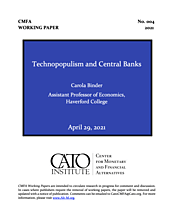In recent years, warnings of a populist threat to central bank independence have proliferated. These warnings are based on a deep-seated antagonism between technocracy and populism. Central bankers, “with their PhDs, exclusive jargon, and secretive meetings,” are the “rootless global elite the populist nationalists love to hate” (Rajan 2017). A concern, then, is that as populist movements gain strength, they will transfer the reins of monetary policy from these quintessential technocrats to “the people,” eroding central bank independence and price stability (Buiter 2016, de Haan and Eijffinger 2017, Goodhart and Lastra 2017, Masciandaro and Passarelli 2018, Financial Times Editorial Board 2019).
I argue that to understand current challenges for central banks, we should question the assumed antagonism between populism and technocracy. Political scientists Chris Bickerton and Carlo Accetti (2021) claim that that advanced democratic states today are in a technopopulist age, “increasingly ordered around the combination of appeals to the people and to expertise and competence” (pg. 157). These appeals do not clash, for “both populism and technocracy are based on unmediated conceptions of the public good–popular will and an objective ‘truth’” (pg. 155). They add:
Neither of these conceptions emerge out of a process of articulation and reconciliation between conflicting interests and values within society but are rather assumed to be given in advance of the political process itself. Both populism and technocracy dispense with the dimension of political mediation because they claim to have direct access to the ultimate ground of political legitimacy itself. This is reflected in their distinctive modes of political organization. Populism relies on the cultivation of a direct relationship of ‘embodiment’ between the populist leader and his or her electoral base while technocracy is based on an informal relationship of ‘trust’ between the technocrat and those he is supposed to govern, rooted in the assumption that the former possesses a specific ‘competence’ or ‘expertise’, tied to his or her personal qualities and professional qualifications. Both populism and technocracy dispense with ‘intermediary bodies’ and other forms of mediation between society and politics, seeking to establish a more ‘direct’ kind of relationship between the two” (Bickerton and Accetti 2021 pg. 155).
This paper discusses central bank independence in the technopopulist age. First, I describe the inherent tension around the role of expertise in a democracy, and how this tension has been approached in the delegation of monetary policymaking to independent central banks. In particular, I explain over the twentieth century, we come to justify leaving such “far-reaching powers…in the hands of a small number of men” (Friedman 1962 pg. 180). The conventional justification for this delegation of power involves the use of transparency as a mechanism for providing accountability to elected representatives (Bernanke 2007). This arrangement has proved tenuous as democracy itself has evolved. Next, I discuss the transition from an era of ideological political logic to the current era of technopopulism. Technopopulism, which has its roots in a crisis of representation, is closely associated with online digital technologies that democratize participation in the public discourse.
Then I explain how the technopopulist influence is especially evident in recent pressures on central banks, changes in central bank communication, and recent amendments to the Federal Reserve’s longer-run strategy. An important point is that under technopopulism, populists do not reject technocratic expertise, but instead rely on it to translate their causes into policy. Central banks thus face pressure to use their technocratic discretion to do more to serve the people, and to be directly accountability to the people rather than to elected representatives. In return for greater responsiveness, they gain even greater power and discretion. The technopopulist logic, I argue, implies that central banks will increasingly become “the only game in town,” both reflecting and exacerbating democratic discontent.


